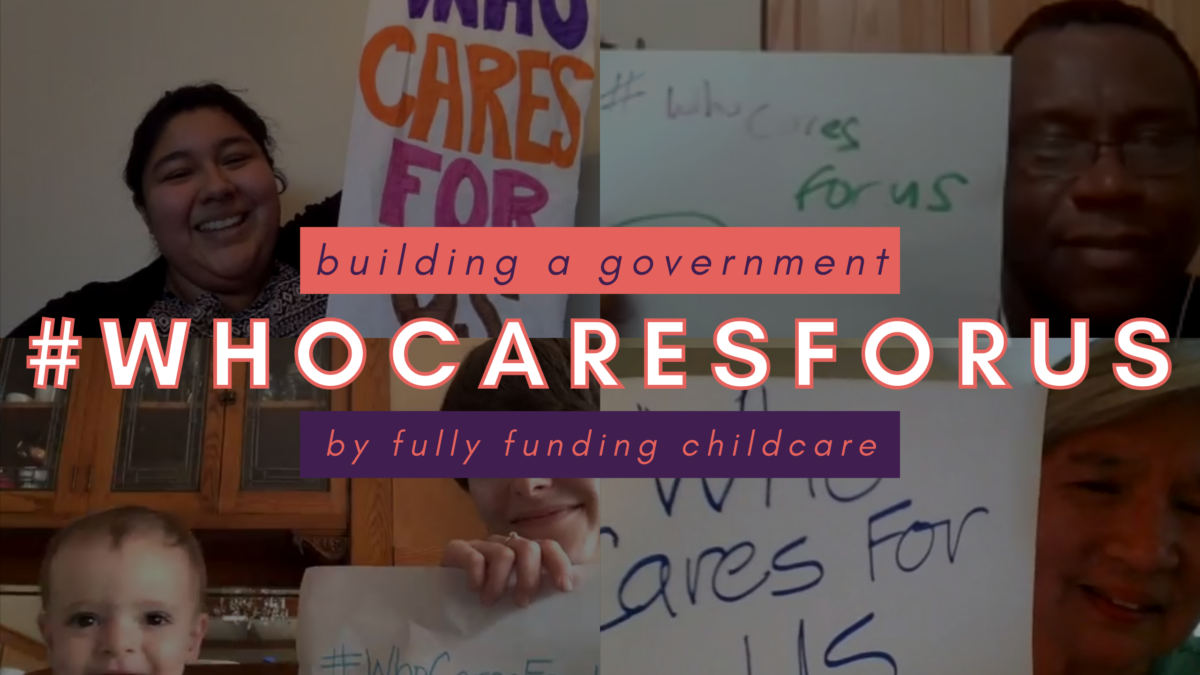
Childcare LTEs
Childcare is an essential element of a caring economy. Centers, providers, teachers, parents, children, and communities as a whole deserve socially and financially equitable childcare that is fully and sustainably funded.
ISAIAH and Kids Count On Us leaders have taken action by sharing their perspectives as childcare professionals in the form of LTEs and daily personal actions. Together, we make Minnesota’s future for children today and tomorrow.
Christina Valdez
The governor’s proposed funding through 2021 will allow many child care centers to keep their doors open and maintain the high quality of care and education they strive for and that our children require.
As directors of community-based child care centers here in Rochester, we want to ensure that all Minnesotan families have access to quality child care no matter their skin color, or what’s in their wallets. On Tuesday, Gov. Tim Walz showed his commitment to our youngest Minnesotans in his proposed 2021 budget. His administration pledged to ensure that the wealthiest Minnesotans and large corporations contribute their fair share to child care. Together, we will increase funding for centers and access for families.
During the pandemic, early childhood educators stepped up and stayed open for thousands of families across Minnesota. Our state needs us. But due to chronic underfunding, even before the pandemic, many centers have barely been able to make ends meet during the past 10 months. Fortunately, state leaders recognized the critical importance of child care in ensuring a healthy economy and provided emergency funds and flexibility in programming during the Peacetime Emergency.
The governor’s proposed funding through 2021 will allow many of us to keep our doors open and maintain the high quality of care and education we strive for and that our children require. This is also a common-sense solution to helping our economy stabilize and thrive. A long-term, critical sector funding solution will allow us to pay our teachers more equitable wages and offer health insurance benefits so they can stay in the profession they love and develop essential long-lasting ties with the children and families in our community. This funding will also allow us to afford the safety and enrichment supplies so necessary for the children’s learning environment. Cleaning supplies, Wi-Fi for our school-age children doing distance learning, and tools for our children’s brain development and motor skills, will enhance our children’s lives in profound ways.
Proposed funding in the governor’s budget will also help children on the waitlist for child care assistance for months, or even years, receive the care and education they need. The governor’s commitment to making child care more accessible to the many families who can’t afford the staggering cost supports our workers, economy, and the next generation.
As Minnesotans, we help each other. Whether it’s shoveling our neighbor’s car out of a snowbank or sharing a home-cooked meal after the loss of a loved one, we are there for each other. If we all contribute our fair share, we can fund things like child care for all our families. Our governor knows it’s time to hold the richest 1 percent and large corporations, who have continued to profit during the pandemic, accountable by supporting their neighbors just like we do. He is leading us in the right direction, and we hope our local legislators share the same clarity and courage to help us pull through the pandemic together and come out thriving. Fully funding child care is our opportunity to put our children and future generation first.
Rochester Post Bulletin, January 30 2021
Debra Messenger
I’m a child care provider who’s worked in the business for 20 years to provide a safe and caring environment for young children to learn and grow. Child care has always been essential for families across Minnesota—no matter what we look like or what’s in our wallets and continues to be during the pandemic.
Years of chronic underfunding coupled with added pandemic safety measures have pushed many centers and families to the brink. Even before the pandemic directors were struggling to pay our teachers what they’re worth let alone above the poverty line. Many I know took pay cuts rather than close their doors. The gaps in funding are covered not only by providers but also by families and have been for years. With child care often more expensive than college tuition, many families are on waitlists for years or make just over the maximum income to receive assistance excluding them from the care they need.
State funding has been keeping many centers afloat, but with no plan to extend funding into next year, I don’t know how we will continue. We are working tirelessly to ensure that the next generation of Minnesotans has the child care they need, and our legislators need to support us in this difficult time and beyond by fully funding child care. If we all pitch in our fair share there will be enough to fund the child care we need.
Brittany Maloney
Child care is essential for the thousands of workers that keep our communities running every day. And every Minnesotan family– white, Black, or Brown and of all income levels should have access to quality care. Through my role as director of Jardin Spanish Immersion Academy, a child care center in St. Paul, I see both how unaffordable care is for many families and the low pay that teachers receive.
Care can cost as much or more than housing, yet many workers are living paycheck to paycheck. With many families out of work and the cost of additional safety measures for the pandemic, financial pressure has only increased. Providers and families support all of us every day, especially the next generation of Minnesotans, and it’s time for our state legislators to support us by fully funding child care. If everyone including the wealthiest in our state paid their fair share, we would have enough.
Lynn Hoskins
I’ve worked in early care and education for over 45 years. I have met so many wonderful families from all different income levels and
ethnicities but they all have one thing in common–they want the best for their children.
And all of our children, from infants on up, deserve the best opportunity for learning no matter their skin color or how much money their families have. A solid early education is crucial to a child’s success. Countries such as Australia, England, Finland, Hong Kong, the Republic of Korea and Singapore recognize this and provide programming to support their children from birth. As one of the top 15 wealthiest nations in the world, we have no excuse for allowing our children to fail.
The state of Minnesota has the greatest racial disparity in rates of school success in the United States. So what do we do about this? We need to support early care and education. Let’s take the load off struggling families and pay staff a living wage. And we can provide it for everyone. There is enough money if those with the most pay their fair share. All of us will benefit, today and tomorrow.
Martha Higuera
To the Editor, in response to Ed Lotterman’s September article, “Real World Economics: COVID-19 is changing our economy; is it permanent?”:
As a public-school teacher and mother of two young children, this pandemic has reminded me—more than ever before—that there is no replacement for quality childcare. But early childcare teachers who have been working tirelessly since March have largely been overlooked in conversations around “educators”. Most early childhood teachers earn $30,000 less than a K-12 teacher—so little, in fact, that many teachers themselves would need child care subsidies in order to afford childcare for their own children.
In Minnesota, childcare costs more than college tuition. Many small centers and in-home providers who already operated on tight budgets are struggling to make payroll during COVID and even more are folding. Many lose out on funding streams given easily to corporate chains or school district-run essential worker child care models. I know directors who go without a paycheck so that they can pay their teachers. State relief money ends on December 31st with no plan to extend.
It’s time to fund child care for all.
Pioneer Press, December 4th 2020
Christina Valdez
Invest in innovative approaches to child care
Like so many frontline workers, child care providers have been fearless in the face of this pandemic. Moreover, the early care and education industry has proven to be essential to the health of our economy, as well as highly innovative and adaptable.
Since March, the staff at Listos and childcare centers across Rochester and the state have adopted new approaches to keeping children, staff and their families healthy and safe, while also ensuring that every child has access to the care, education, up-to-date information, food, transportation, housing and health care that they need. Our early educators have also taken action to support school-age children through distance learning. We’ve done so with restricted budgets, increased expenses, and limited state funding, which runs out Dec. 31.
Now it’s time for our state and federal governments to come together to restructure legislation to fund early care and education as the essential, public service that it is. All Minnesotans need quality early learning and child care no matter our skin color, zip code, or financial status. It’s the kind of investment in innovation that will help our communities not only survive, but thrive.
Rochester Post Bulletin, December 9th 2020
Helen White
I read with interest Dave Orrick’s analysis of “What to expect from the 2021 Minnesota legislative session” last week. I was glad to hear that the House Majority Leader plans to prioritize childcare. I am an early childhood director, teacher, and mother, and I see how hard providers, teachers, and families are working to get by in this pandemic.
Childcare has been underfunded for years and with the pandemic’s added financial strain, many centers have folded, putting teachers out of work. Now, even fewer parents can afford the care their families need. It’s time for our legislators to come together to support the next generation of Minnesotans and all who care for them by fully funding childcare.
If all of us, including the wealthiest, pay our fair share, then we will have enough to go around. After all, our greatest investment should be in our children who are the next generation.
Rochester Bulletin, January 14 2021
Categories
- Announcements (11)
- Childcare (8)
- Community Safety (10)
- Criminal Justice (18)
- Democracy (28)
- Economy & Jobs (27)
- Education (16)
- Environment (11)
- Faith (15)
- Health (22)
- Housing (30)
- Immigration (31)
- Islam (11)
- Newsletter (34)
- One Body (2)
- Other Issue Work (14)
- Public Safety (3)
- Report (7)
- Transit (19)
- Uncategorized (40)
- Working Families (18)



